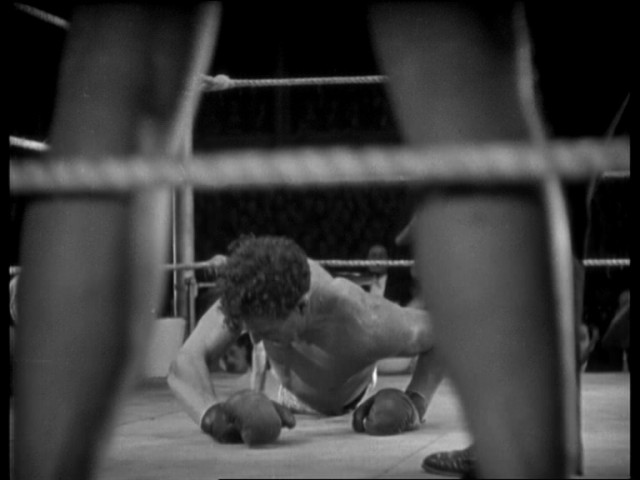
Alfred Hitchcock boxing picture sounds the bell at Film Forum as part of massive festival celebrating the Master of Suspense
THE RING (Alfred Hitchcock, 1927)
Film Forum
209 West Houston St.
Sunday, March 23, 3:00, Monday, March 24, 7:30, and Sunday, May 4, 3:30
The Complete Hitchcock: February 21 – March 27
The Hitchcock 9: February 21 – May 4
212-727-8110
www.filmforum.org
 When one thinks of Alfred Hitchcock, such psychological thrillers as North by Northwest, Psycho, Vertigo, Notorious, and Rear Window come to mind, not The Manxman, Easy Virtue, The Pleasure Garden, and The Farmer’s Wife. But it is these early, British silent films that are the focus of Film Forum’s “The Hitchcock 9,” which is part of the larger series “The Complete Hitchcock,” consisting of every other picture Sir Alfred made, including those abovementioned films. The dual festival features DCP restorations of nine romantic melodramas made by the Master of Suspense, each one with live musical accompaniment by pianist Steve Sterner. The series continues with 1927’s The Ring, a tantalizing tale of a love triangle set in the world of boxing, a favorite sport of Hitchcock’s. When Bob Corby (Ian Hunter) shows up at a county fair and takes a liking to Mabel (Lillian Hall-Davis), who sells tickets to see her fiance, “One-Round” Jack Sander (Carl Brisson), battle all comers for a cash prize, Corby decides to get in the ring with Sander to impress Mabel; little do they know that Corby is a professional. Soon the two men are also fighting outside the ring, to win the heart of their beloved. Comic relief is supplied by Gordon Harker as Jack’s trainer, who makes some very funny faces throughout. One can see Hitchcock’s visual style emerging in The Ring, as he employs little dialogue in favor of dramatic montages, ghostly superimpositions, and shadowy lighting. The intriguing work, produced at Elstree Studios and the first film to be released by Gainsborough Pictures, also deals with issues of class and financial success, themes that will become prevalent in much of Hitchcock’s oeuvre.
When one thinks of Alfred Hitchcock, such psychological thrillers as North by Northwest, Psycho, Vertigo, Notorious, and Rear Window come to mind, not The Manxman, Easy Virtue, The Pleasure Garden, and The Farmer’s Wife. But it is these early, British silent films that are the focus of Film Forum’s “The Hitchcock 9,” which is part of the larger series “The Complete Hitchcock,” consisting of every other picture Sir Alfred made, including those abovementioned films. The dual festival features DCP restorations of nine romantic melodramas made by the Master of Suspense, each one with live musical accompaniment by pianist Steve Sterner. The series continues with 1927’s The Ring, a tantalizing tale of a love triangle set in the world of boxing, a favorite sport of Hitchcock’s. When Bob Corby (Ian Hunter) shows up at a county fair and takes a liking to Mabel (Lillian Hall-Davis), who sells tickets to see her fiance, “One-Round” Jack Sander (Carl Brisson), battle all comers for a cash prize, Corby decides to get in the ring with Sander to impress Mabel; little do they know that Corby is a professional. Soon the two men are also fighting outside the ring, to win the heart of their beloved. Comic relief is supplied by Gordon Harker as Jack’s trainer, who makes some very funny faces throughout. One can see Hitchcock’s visual style emerging in The Ring, as he employs little dialogue in favor of dramatic montages, ghostly superimpositions, and shadowy lighting. The intriguing work, produced at Elstree Studios and the first film to be released by Gainsborough Pictures, also deals with issues of class and financial success, themes that will become prevalent in much of Hitchcock’s oeuvre.